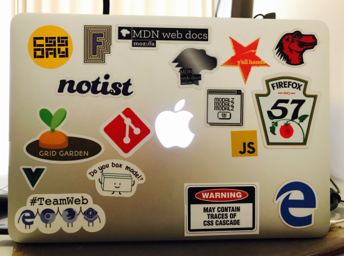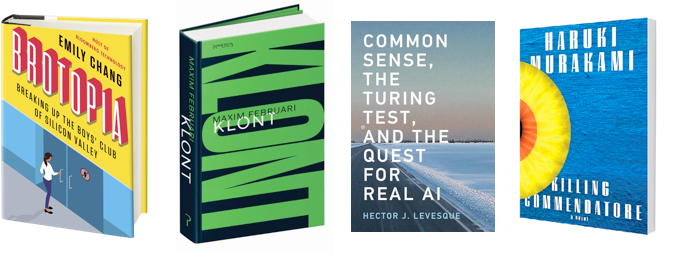The year is about to end, so here is another year in review post!
Some might think it is odd to summarise one’s own year, but I think it is fun to share some facts and thoughts. I love reading these kinds of posts from others (hi Zell, Andy, Chee-Aun, Nienke, Heydon). So here we go. Like last year, I’ve divided stuff into highlights and things I learned. To be clear, that doesn’t mean I had a year consisting of 100% highlights and learnings. That would be weird. Of course there was also stuff that went wrong, wasn’t amazing or was personal. I just think they’re for elsewhere (in person over drinks).
Highlights
Projects
In 2018, I spent most of my time in Mozilla’s Open Innovation team, that I’ve been part of for over a year now (as a contractor). I feel very lucky to get to work with so many smart people. I’m specifically working on the IAM project. For those unfamiliar with the acronym: IAM is short for identity and access management, it is about how people prove who they are (for instance, with email or a third party) and get access to stuff with as little friction as possible. That is particularly challenging when people have multiple identities, which most do. As part of the IAM effort, it’s been super exciting to build most of the front-end for a project codenamed “DinoPark”, which is currently in closed beta. I’m excited to continue this work in 2019 and share more when we can.
In Q4, I also spent a day a week working at the City of The Hague, specifically helping with improving accessibility and profesionalising front-end development of their digital services. It’s been great to see improvements shipped both in the application’s code as well as the content management system product. Looking forward to what we’ll do next year.
Other short engagements included:
- teaming up with Jeroen and Peter, I helped NOS, the Dutch broadcaster, with an accessibility audit, user tests with visually impaired users and an in-house presentation on technical accessibility
- I ran a one day workshop on accessibility guidelines at Zilveren Kruis
- with Peter, I worked on JavaScript to power a chat-like interface for the Dutch government
Volunteering
I did not do a lot of volunteering this year, but I did translate the Inclusive Design Principles into Dutch and worked on improving MDN documentation on accessibility.
Cities
This year, I traveled to Munich, Bristol, Munich (twice), Taipei, San Francisco, Mountain View, Paris, Como, London (twice), Berlin (twice), and Düsseldorf. I’m not so proud of this carbon footprint, and experimented with European train travel, which took a bit more time, but was pretty ok for productivity.
 My terrible attempt at taking a panorama picture from the rooftop of the Mozilla offices in San Francisco
My terrible attempt at taking a panorama picture from the rooftop of the Mozilla offices in San Francisco
Conferences and events
This year, I attended these events:
- Beyond Tellerand Munich
- Fronteers Conference
- Mozilla Festival (UK)
- performance.now()
- Design Ethics Conference
 Proof that I attended events: new stickers!
Proof that I attended events: new stickers!
I spoke multiple times, too:
- about password managers at MozTW community meetup (Taiwan) and #HackOnMDN (UK)
- about graphic design and the web at Front-end United and CSS Day
- about accessibility essentials at Refresh Conference
- about philosophical ethics at Accessibility Club Conference (Germany)
I did my CSS Layout workshop three more times (for Fronteers and at Front-end United) and ran a new accessible components workshop (for Frozen Rockets).
Organisers, thanks so much for having me, a newbie speaker. The first time conference speaking was stressful, time-consuming and very scary, but also satisfying. I got great feedback, both praise (yay!) and things I can improve on (thanks, you know who you are).
I’d love to speak more in 2019, please do get in touch if you want to have me present at your event or give a workshop.
Writing
I published 26 posts on this blog, not including this one. Like I said in last year’s review: I very much recommend writing to fellow people who work on the web, it can be helpful in many ways. It is also great to be able to do this on a domain you own, on pages you designed and built. If anyone needs mentoring around this, get in touch, I would love to help!
Some of the most read posts:
- More accessible markup with display:contents on a bug in
display: contentsimplementation in major browswers that undoes accessibility benefits the property could have brought otherwise (since fixed in Firefox stable and being fixed in Chromium) - What kind of ethics do front-end developers need? - in which I tried to make the idea of ‘more ethics’ practical for front-end developers
- Let’s serve everyone good looking content on, wow, really, in 2018, that websites don’t need to look the same in 2018. I find this is still a thing at my clients and those of devs I talked to.
- How to make password managers play ball with your login form sharing what I learned about password manager compatibility
Reading
It felt a bit weird to have the Goodreads app keep me in check reading-wise, but it did the job. I managed to read more than the goal I set: 46 books. Some that readers of this blog might find interesting:

- Brotopia, about the ‘bros’ that founded some of the biggest Sillicon Valley corporations and the culture they created. I must admit some doubts towards the word ‘bro’ , but wow, the book taught me a lot about how I don’t want to be and where I don’t want to work.
- Klont – if you read Dutch, get it! This novel brilliantly captures the phenomenon ‘datafication’ and how it endangers some of the basic concepts of free societies, as well as, unrelated, the phenomenon of ‘experts’ traveling the world to give talks
- Common sense, the Turing test and the quest for real AI – sometimes fairly technical and academic, but I loved the hype-free thinking about artifical intelligence and what to expect from it
- Killing Commendatore – if you’re into Murakami or want to start reading his work, this is great. It is a lot of pages, in two parts, but worthwile. I read the Dutch translation, it is available in many other languages, too.
For all the ‘big data’ and AI expertise that Amazon, which owns Goodreads, has, the app is still very bad at recommending new books. For me, it doesn’t go beyond what the most generic airport bookshops stock. The real human beings I follow on the platform brought much more reading inspiration.
Things I learned
Some random things I learned:
- I finally got my hands dirty in declarative client-side component frameworks. My framework of choice was Vue.JS. I learned concepts like routers, props down / events up, reactivity and lifecycle hooks, found they mostly just made sense and enjoyed working in this paradigm. I also found that within these concepts, I mostly wrote just JavaScript, good markup and sensible CSS. For instance, X is now ran inside a lifecycle hook, but X itself is just a method in JavaScript. Y is exposed as a component template, but Y itself is just plain old good
table. - I learned in multiple projects this year how hard it can be to explain the concept of focus. It exists as a thing in the browser (the
document.activeElement), but also as a thing in people’s thinking, not necessarily the same way. And then I’m not even talking about indicating focus yet. In my talk in Groningen I spent a number of slides trying to get it crystal clear. I like Laura Carvajals “You wouldn’t steal their cursor” and tried a streetlights metaphor (they are not pretty, but if they’re not there, you can’t see where you’re going at night) - I worked with WCAG 2.1 in real projects (testing for the newly added success criteria and talking about them in slides)
- I added CSPs to some sites (see also How I learned to stop worrying and love CSPs)
- I did more background reading to better understand the world we’re developing front-ends for (super meta), inspired by various colleagues, conference speakers and friends
- It’s totally workable to use Firefox Nightly as a main development browser, I had expected the occasional crash, because it is an early release channel, but had none. It is not as unstable as it advertises as. Also: tabs and sessions get recovered after updating (I knew this, but had not taken the risk before).
What I want to get better at next year:
- writing and presenting
- I want to try and build something with Rust
- get more people excited about having a personal website with a blog
- take more time off
With that, I wish all readers a fantastic 2019! If anyone has written year in review posts, I’d love to hear about them in the comments/webmentions, and read what you have done.
Comments, likes & shares
No webmentions about this post yet! (Or I've broken my implementation)